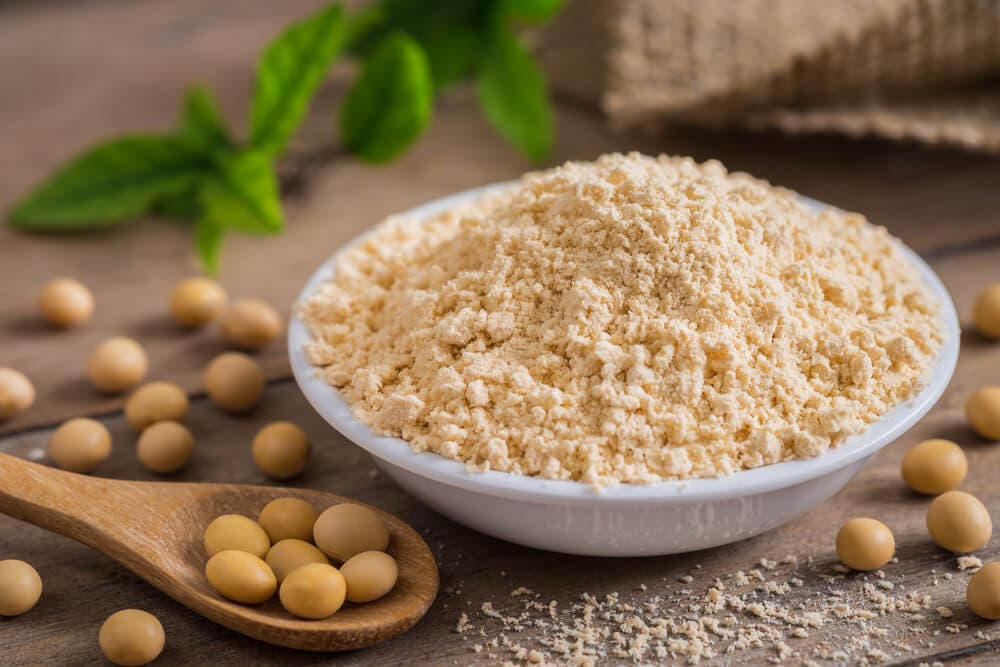Soy protein is one of the most complete and beneficial plant proteins. In fact, you have next to nothing to envy from proteins made from animal ingredients. More and more people are deciding to bet on taking advantage of the benefits of soy protein. This plant-based food is a complete source of essential amino acids that positively affect vital functions for the body.

Soy is a species of the legume family cultivated since ancient times for human consumption. Grain and its by-products, such as milk and tofu, have become symbols of the vegetarian and vegan movements.
And it is that, unlike animal proteins, it is an alternative free of cholesterol, saturated fats and other elements harmful to health. In addition, it is suitable for lactose intolerant and can be useful to replace meat. What is it and what are its benefits?
What is soy protein?
Soy protein is a high-quality protein obtained from soy beans. It is distinguished by being the main source of plant amino acids, being ideal to replace protein foods of natural origin.
Its consumption is effective for the maintenance and restoration of muscles after physical training, which favors the formation of muscle mass. In addition, it is of high energy value and supports important functions such as the synthesis of hormones and absorption of nutrients.
Unlike other plant foods with protein, soy provides all amino acids, essential and non-essential. Of these, some important ones should be highlighted, such as:
- Tryptophan
- Methionine
- Isoleucine
- Leucine
- Histidine
- Threonine
- Phenylalanine
- Cysteine
- Arginine
- Lysine
- Glycine
In addition, it provides flavonoids, isoflavonoids, phenolic acid and other components with antioxidant effects. Because of this, including it in the diet protects the body against free radicals and supports weight loss.
Benefits of soy protein
The benefits of soy protein support the nutrition of athletes or fitness fans. In fact, it has become one of the whey protein alternatives, especially for those who want to follow a vegan diet.
Despite being a vegetable protein, it is very complete and its amino-gram does not have much to envy to the options of animal origin. Below we review the main reasons to start consuming it.
1. Improves digestion
One of the most prominent benefits of soy protein is its ability to improve digestion. Thanks to its high contribution of B vitamins, it intervenes in the enzymatic processes that help to have an optimal digestive process.
In addition, it participates in the synthesis of fatty acids and helps to optimize the functioning of the immune system. The best thing is that it does not contain lactose and prevents inflammatory crises in the intestine.
2. Regulate cholesterol
Thanks to its lecithin content, this vegetable protein can help control high cholesterol levels. In fact, it increases the secretion of good cholesterol (HDL) recognized for its ability to remove harmful lipids from the arteries.
3. Supports the formation of muscle mass
Without a doubt, this is one of the main benefits of soy protein. Thanks to its balanced supply of essential amino acids, it is ideal for caring for and increasing muscle mass. Its assimilation helps reduce the degradation of muscle fibers and prevents fatigue after training.
4. Fight overweight
This variety of vegetable protein is an excellent supplement for overweight patients. Since it boosts energy expenditure and favors the formation of lean mass, it is recommended to achieve a healthy body mass index.
Now, it is not a miracle product to lose weight. Therefore, to see its affects you must follow a diet according to the needs of the body.
5. Prevents fluid retention
The potassium that this food contains allows counteracting excess sodium to avoid fluid retention. As some know, this problem affects muscle health and affects weight gain.
Disadvantages of soy protein
The benefits of soy protein give enough reason to add it to the diet; however, its disadvantages should not be overlooked. Which are?
- It can alter the endocrine system due to its genistein content. This protein affects the functions of the pancreas and thyroid.
- In the case of men, it affects the quality of the sperm and reduces the levels of androgens.
- It can affect hormonal changes due to its phytoestrogen content.
- Soy protein can cause allergic changes and, in some cases, cause alopecia.
Are you looking for a vegetable alternative to get enough protein? Do not rule out this option. While it is important to consider its disadvantages, it is almost never a problem. If you have any questions, ask your doctor or a trusted nutritionist.















